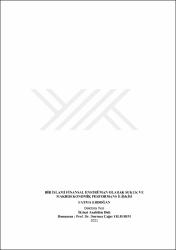| dc.contributor.advisor | Yıldırım, Durmuş Çağrı | |
| dc.contributor.author | Erdoğan, Fatma | |
| dc.date.accessioned | 2022-04-06T06:49:23Z | |
| dc.date.available | 2022-04-06T06:49:23Z | |
| dc.date.issued | 2021 | |
| dc.identifier.uri | https://tez.yok.gov.tr/UlusalTezMerkezi/TezGoster?key=tqUiYt63sTQLTpozMJ92QtiyoZCXWOcdYQAIcWLjBFEolOEuwHwaR4QHFK4NJvaV | |
| dc.identifier.uri | https://hdl.handle.net/20.500.11776/4080 | |
| dc.description.abstract | İslam dini inanç ve bireyin maneviyatına hitap eden kurallar yanında, hukuki, sosyal, siyasi ve ekonomik yaşantıyı da kapsayan kural ve tavsiyeleri içermektedir. Bu kurallar ve tavsiyeler birey yanında toplumu da ele alan hukuki, ekonomik ve sosyal konulardır. Bu geniş kapsam çerçevesinde İslami bankacılık ve İslami finans, İslam ekonomisi düşüncesinden doğarak çeşitli İslami finansal enstrümanlar geliştirmiştir. 20 yılı aşkın bir süredir öne çıkan önemli finansal enstrümanlardan biri de sukuktur. Bu çalışmada, bir İslami finansal enstrüman olarak sukuk uygulamasının makroekonomik performans üzerindeki etkileri araştırılmıştır. Çalışmada, 7 ülke için 2014Q1-2020Q1 döneminde çeyrek dönemlik veriler ile sukuk hacim ve yoğunluğunun büyüme üzerindeki etkileri ele alınmıştır. Analiz kapsamına Endonezya, Ürdün, Kuveyt, Malezya, Nijerya, Suudi Arabistan ve Türkiye alınmıştır. Elde edilen sonuçlara göre sukuk hacminin iktisadi büyüme üzerinde bir etkisinin mevcut olmadığı görülmüştür. Diğer yandan sukuk yoğunluğunun %3.14 seviyesine kadar iktisadi büyümeyi pozitif şekilde etkilediği tespit edilmiştir. Bu seviyenin üzerinde ise etki anlamsız hale gelmektedir. | en_US |
| dc.description.abstract | The religion of Islam is not only a set of rules and beliefs that appeal to the spirituality of the individual but also it is a combination of rules and recommendations that cover the legal, social, political, and economic life of the society. In this vein, Islam contains very detailed rules and recommendations on the principles of the economy. Islamic banking and Islamic finance emerged from Islamic economics and developed various Islamic financial instruments. One of the prominent financial instruments for the last 20 years is sukuk. In this study, the effects of sukuk, as an Islamic financial instrument, on macroeconomic performance are investigated. In the study, the effects of the volume and density of sukuk on growth are discussed with the quarterly data of 7 countries for the period 2014Q1-2020Q1. Indonesia, Jordan, Kuwait, Malaysia, Nigeria, Saudi Arabia, and Turkey are included in the scope of the analysis. Empirical findings indicated that the volume of sukuk had no effect on economic growth. On the other hand, sukuk density has a positive effect on economic growth up to the level of 3.14%. Above this level, the effect becomes insignificant. | en_US |
| dc.language.iso | tur | en_US |
| dc.publisher | Tekirdağ Namık Kemal Üniversitesi | en_US |
| dc.rights | info:eu-repo/semantics/openAccess | en_US |
| dc.subject | Ekonomi | en_US |
| dc.subject | Economics | en_US |
| dc.title | Bir İslami finansal enstrüman olarak sukuk ve makroekonomik performans ilişkisi | en_US |
| dc.title.alternative | The relation between sukuk as an Islamic financial instrument and macroeconomic performance relations | en_US |
| dc.type | doctoralThesis | en_US |
| dc.department | Enstitüler, Sosyal Bilimler Enstitüsü, İktisat Ana Bilim Dalı | en_US |
| dc.identifier.startpage | 1 | en_US |
| dc.identifier.endpage | 206 | en_US |
| dc.institutionauthor | Erdoğan, Fatma | |
| dc.relation.publicationcategory | Tez | en_US |
| dc.identifier.yoktezid | 699979 | en_US |



















